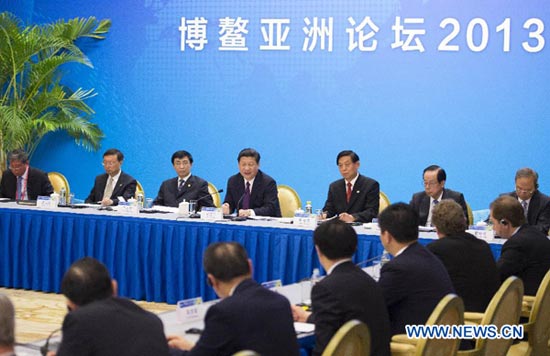
 |
| Chinese President Xi Jinping (C back) attends a discussion with representatives of entrepreneurs from both home and abroad during the Boao Forum for Asia (BFA) Annual Conference 2013 in Boao, south China's Hainan Province, April 8, 2013. (Xinhua/Li Xueren) |
BOAO, April 8 (Xinhua) -- President Xi Jinping said Monday that the country will sustain "relatively high" economic growth but refrain from only seeking speed in growth.
China's development is generally in good shape and the country will move upward for a long time, Xi said while meeting with representatives of about 30 well-known enterprises from China and abroad at the ongoing Boao Forum for Asia (BFA) Annual Conference 2013.
"With our efforts, China will sustain relatively high economic growth, but not super-high economic growth. It is not necessary," he said.
The country's GDP grew by 7.8 percent in 2012, the slowest pace in 13 years.
Xi said the figure was lower than in previous years partly due to efforts to control the speed of economic growth and accelerate the transformation of China's growth model.
"It does not mean we cannot maintain economic growth at a very fast pace," he said, "we just don't want to anymore."
At the government's annual legislative session held in March, the government set this year's GDP growth target at 7.5 percent to leave room for economic restructuring.
This marks the second consecutive year for the world's second-largest economy to target 7.5-percent growth.
The country will not solely pursue high-speed economic growth, Xi said, adding that it will focus more on the quality and efficiency of economic development.
The country will put more efforts toward green development, recycled development and low-carbon development, he said.
It needs to balance industrial development and green, sustainable development, he said.
Fan Gang, an economist and former advisor to China's central bank, said in an interview in March that China is far from saying goodbye to rapid growth, but rapid growth is not necessarily equivalent to overheated growth or double-digit growth highlighted by soaring inflation and asset bubbles.
"From this perspective, I see no problem for China to maintain rapid growth for another 20 or 30 years," said Fan.
According to the president, the country has set two goals of building a moderately prosperous society in all respects by the time the Communist Party of China (CPC) celebrates its centenary in 2021 and turning the nation into a modern socialist country that is prosperous, strong, democratic, culturally advanced and harmonious in time for the People's Republic of China to mark its centennial in 2049.
"Realizing those goals will bring vitality and strength to China's economy," he said.
China is going through a period of heavy industrialization and urbanization, while the country's information industry is developing rapidly and agriculture is being modernized, creating great potential in the domestic market, he said.
Zhang Yansheng, a researcher with the National Development and Reform Commission (NDRC), agreed with Xi's description of China's future.
"China aims to move from being a middle-income society to being a high-income one in the next three decades, which is a real historic change," Zhang said.
The next three decades will be China's "golden age" and those who engage with China will prosper alongside it, he said.
FIRM PROMISE
Xi made a promise to further open China's market and share the country's opportunities with the rest of the world.
China will "expand, deepen and widen" its economy, firmly oppose protectionism in any form and prepare itself to solve economic and trade differences with other countries through consultation, he said.
Xi reiterated that China's development is a win-win process that can benefit the rest of the world, including its neighbors.
Last year, about 15.76 million Chinese people traveled to neighboring countries in east and southeast Asia. Over the next five years, China's imports will reach 10 trillion U.S. dollars and its outbound investment is expected to grow rapidly.
Yuan Gangming, a research fellow with the Center for China in the World Economy at Tsinghua University, said Xi's comments have clarified the country's economic future and opening-up policy.
"Making such a statement at the Boao forum indicated a positive attitude regarding the trade and business conflicts China has been facing in recent years," Yuan said.
The BFA, a non-governmental and non-profit international organization founded in 2001, attracted more than 2,500 politicians and businessmen from around the world this year.
















 Life aboard a fishing boat under bridge in city of Chongqing
Life aboard a fishing boat under bridge in city of Chongqing


![]()
